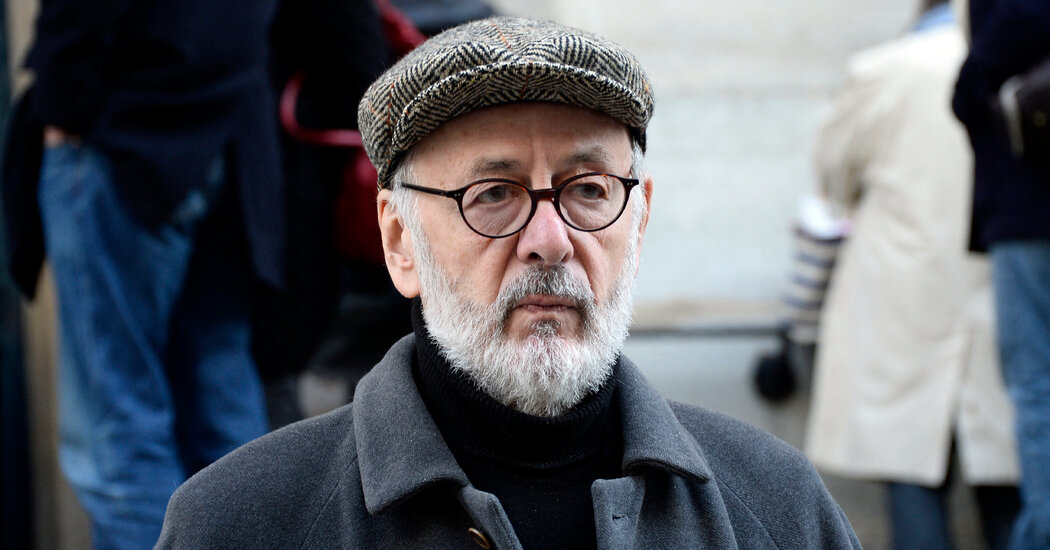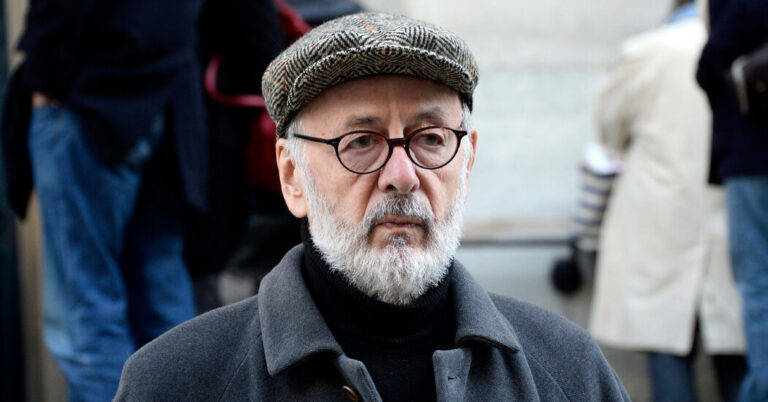Bertrand Blier, an acclaimed director whose film scandalized, fascinated and entertained France of the 70s and 80s with their sometimes brutal projections of the sexual imagination of French men, died on Monday in his home in Paris. He was 85 years old.
His death was confirmed by his son Léonard Blier.
For two decades Bliers was one of the most decorated French directors, winning the first prize in Cannes, an Academy Award for best foreign film for “Get Out Your Handkerchiefs”, released in 1978, and numerous Césars, the French equivalent of the Oscar .
In a statement after his death, President Emmanuel Macron greeted Bliers (Blee-Ay pronounced) as a “French cinema giant, who marked our national imagination for fifty years with his free and pungent touch”.
Blier launched the career of men and women who would dominate the French screen for decades, including Gérard Depardieu, with whom he made nine films. One of the latest public acts of Blier was to join others in the French film community to defend Depardieu in 2023 in the face of the accusations of sexual harassment and attacks on the actor. (Macron also defended Depardieu, who now has to face criminal accusations and a trial in March)
The legacy of Mr. Blier is contested for the same reasons as that of Mr. Depardieu. His best known films, and in particular his success in 1974, “Les Valseuses” (“Going Places”), starring Depardieu, are permeated with misogyny and depictions of women as sexual objects. Presented as a Dark Comedy, “Going Places” – the French title in Slang means “testicles” – it was a huge success at the box office at its release, attracting an audience of almost six million people.
The film has captured an aspect of the French male imagination, and French culture, which sees women as existing bodies to meet the needs of men.
“Going Places” is a Road-and-and-anddy-Movie of rape rapes, sexual aggressions and occasional thefts perpetrated by two thugs in a gloomy background of empty workers and abandoned bathing cities. But it is also cloaked in incongruous carefree, enhanced by a cheeky soundtrack of the violinist and jazz composer Stephane Grappelli.
The film was seen by some critics such as a well -targeted kick to the dulling of the post -war bourgeois France. In 1978, Pauline Kael, writing in the New Yorker, called her “an explosively fun erotic farce – both a celebration and a satire of men’s daydreams”. He called him “clearly fun”.
Not everyone had fun. There were events in front of some cinemas where it was projected, and the newspaper Le Figaro asked for the ban. A particularly ugly scene shows the two friends who sexually attacks a breastfeeding mother, played by Brigitte Fossey, in an empty wagon.
Invited to participate in a French television program last March, Mrs. Fossey refused to review the scene. The female protagonist, the French actress Miou-Miou, defined the “humiliating” shots.
The film has been debated to date. French television has wondered if “Les Valseuses” can still be transmitted, as has been for years; A projection scheduled last year was canceled, another was scheduled for the transmission this year, but only late an hour. Revisiting the film in 1990 on the occasion of his rebirth in theaters, the critic Caryn James wrote in the New York Times that the film “has a bad undertone”.
“The two friends played by Gerard Depardieu and Patrick Dewaere preying women in a cruel and contemptuous way,” he wrote, adding that “creating a flow of women who choose to be seduced and mistreated by men, the film strongly suggests that all women They are whores.
None of the subsequent films of Bliers equaled the commercial success of “Les Valseuses”, although many dealt with similar themes, even if in a less brutal way. In “Get Out your Handkerchiefs”, the character of Depardieu offers his depressed wife to a stranger, to make her happy; It ends up going to bed with a thirteen year old. In “Beau-Père” (1981) a stepfather has a relationship with the fourteen-year-old boyfriend; In 1981, the criticism of the Times Janet Maslin said that the story had been “presented with something less than Nabokovian Auvacy”, but “also its exploitation side is minimal”, saying: “Mr. Blier tells this story with great delicacy. “
In “Too beautiful for you”, winner of the Cannes Grand Prix in 1989, the twist is the abandonment by Depardieu of his beautiful wife, played by Carole Bouquet, for his much simpler secretary (Josiane Balasko) . “Their making love is pure eroticism, which Mr. Blier records with boiling humor and truth,” wrote Vincent Canby on The Times.
At the beginning of the 90s, Blier had largely stopped making successful films; The times seemed to have passed. In a retrospective broadcast this week by the Radio France Culture station, the Cinema Du Cinema critic Yal Sadat stressed what defined the “paradox” of the career of Bliers.
“The French company turned upside down and the spirit of the 70s,” he said in an interview on the channel. But, added Sadat, “from that moment, he was relegated to be a relic of the time, as if he were trapped in the period he had captured so well”.
Mr. Blier himself denied being misogynist. In an interview with the French television character Thierry Ardisson, he said: “The stupid fools in my films are always the boys”. To the insinuation that was worried about sex, did he reply: “What else do you want to talk about? Sport? There is death, sex, women “.
In 2010, he told France Culture: “I like those who lost themselves, the losers”, suggesting that successful people bored him. “In the cinema,” he said, “there is a need for some violence”.
Bertrand Blier was born on March 14, 1939, in the Parisian suburb of Boulogne-Billancourt, son of Bernard Blier, a well-known characteristic actor of French cinema, and Gisèle (Brunet) Blels, who had been a pianist. Bertrand has never achieved the Baccalauréat, the omnipresent French secondary school diploma, and did not go to university. He learned the profession by attending friends of his father and becoming, at the age of 20, a collaborator on the film sets of well -known French directors.
His first film was a documentary, “Hitler, Connais Pas” (1963) – translated approximately such as “Hitler, never heard of him” – a series of interviews with his colleagues who described hopes and aspirations in post -war France. He continued to direct his stormy father – “The most important man of my life”, he told an interviewer, “beautiful and seductive, very funny” – in a 1967 film, “If I were a spy”. But in the early 1970s he devoted himself to writing a novel because cinema seemed not to work for him.
That novel was the basis for “Going Places”, for which Blier pulled the couple, Depardieu and Dewaere out of then minors, who would accompany him for most of the following decade. (Mr. Dewaere died suicide in 1982 at the age of 35.)
“What I did with ‘Valseuses'” – the French title – “was ignoble in his rawness,” he said once to an interviewer of the Ciné+television station. “And I loved that rude appearance of things.”
Regarding Mr. Depardieu, he told France Culture in 2010: “We were made to work together”.
Mr. Blier leaves his third wife, the actress Farida Rahouadj; Two daughters, Leïla and Béatrice Blier; A son, Léonard; A sister, Brigitte Blier; And a nephew.
“He was never an intellectual director,” the critic Sadat on France Culture said this week. “It was above all sensory and fun.”
Susan C. Beachy, Daphne Anglès AND Caterina Porter contributed to research.





